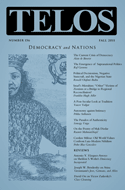Pekka Sulkunen’s “Autonomy against Intimacy: On the Problem of Governing Lifestyle-Related Risks” appears in Telos 156 (Fall 2011). Read the full version online at the TELOS Online website, or purchase a print copy of the issue here.
 Most risk society analyses focus on external risks caused by production, neglecting internal risks produced by consumption. Tobacco, alcohol, obesity, lack of exercise, and other lifestyle-related causes are top global burdens of health, growing with emerging consumer society outside western capitalism. Modern societies have a poor track record in regulating these risks. Neo-liberal hegemony is a weak explanation of the failure. We must see the issue as a problem of justification. Modern social order is founded on individual biography, autonomy, and intimacy as principles of human worth. The twentieth-century modern state has guided the progress to make these ideals reality. Autonomy, the right to individual self-control, has supported the right to intimacy, experience of life as unique and separate from other lives. Today, only quite recently, these principles of worth are fully matured, but autonomy and intimacy are now conflicting. One person’s uniqueness—the pleasure of consumption or cultural identity—is felt to tax the autonomy of others. Vice versa, the autonomy of the majority cuts into the uniqueness of the few. The state has lost its pastoral role to lead the flock to progress, and become apostolic authority merely instructing the faithful on health, security, and well-being from a distance.
Most risk society analyses focus on external risks caused by production, neglecting internal risks produced by consumption. Tobacco, alcohol, obesity, lack of exercise, and other lifestyle-related causes are top global burdens of health, growing with emerging consumer society outside western capitalism. Modern societies have a poor track record in regulating these risks. Neo-liberal hegemony is a weak explanation of the failure. We must see the issue as a problem of justification. Modern social order is founded on individual biography, autonomy, and intimacy as principles of human worth. The twentieth-century modern state has guided the progress to make these ideals reality. Autonomy, the right to individual self-control, has supported the right to intimacy, experience of life as unique and separate from other lives. Today, only quite recently, these principles of worth are fully matured, but autonomy and intimacy are now conflicting. One person’s uniqueness—the pleasure of consumption or cultural identity—is felt to tax the autonomy of others. Vice versa, the autonomy of the majority cuts into the uniqueness of the few. The state has lost its pastoral role to lead the flock to progress, and become apostolic authority merely instructing the faithful on health, security, and well-being from a distance.







